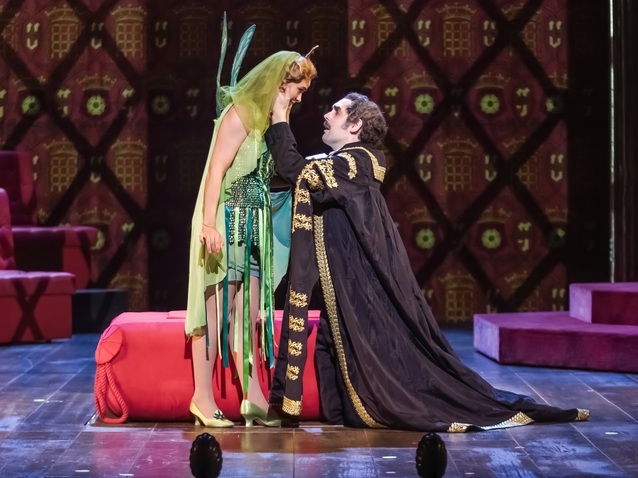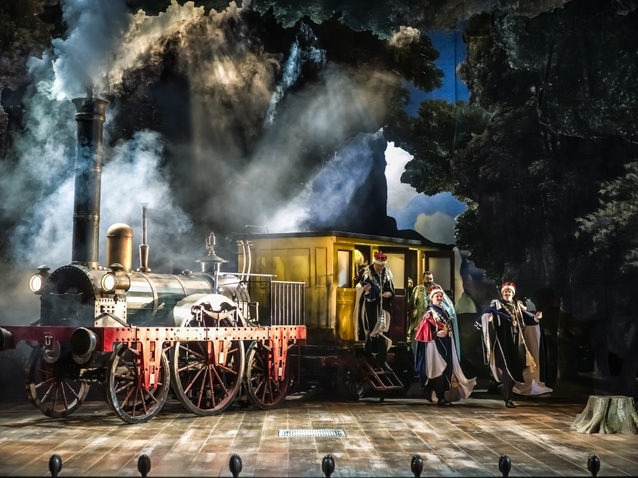 © Craig Fuller
© Craig Fuller
Iolanthe; or, The Peer and the Peri of 1882 is the seventh of Gilbert and Sullivan’s fourteen collaborations. It was their first work to premiere at the Savoy Theatre (although Patience had transferred there in 1881) and ran for 398 performances, while also appearing extensively across the United Kingdom and America. It concerns a Fairy named Iolanthe who marries a mortal man. Although this is a capital offence under Fairy law, the Queen of the Fairies curtails her punishment to banishment and twenty-five years later forgives her and welcomes her back to the fold. Iolanthe had a son, Strephon, by this mortal man, which makes him a Fairy down to the waist only! Strephon is an Arcadian shepherd who wishes to marry Phyllis, but she is a Ward of Chancery who is loved by the Lord Chancellor and indeed every member of the House of Peers.
The Lord Chancellor decides against marrying Phyllis, since it would entail seeking permission to do so from himself and he could not be sure of an affirmative answer! However, persuading himself is the least of his problems as it transpires he is the man Iolanthe married, and thus Strephon’s father. It all has a happy ending, but the opera satirises many of the hierarchies and values inherent in British society. Although Gilbert was commenting on the world he saw around him, there was also something more universal about his observations. For example, to the horror of the Peers, the Queen of the Fairies orders that Lords be selected by competitive examination, and yet reform of the upper chamber is something Britain is still grappling with 150 years later.
Director Cal McCrystal, who played a major role in the hilarious National Theatre hit, One Man, Two Guvnors, has said that with a piece such as this due consideration must be paid to the original language because the humour lies within it. It is not a rule he always follows to the letter, as he does introduce some extra lines and asides, but he does obey its spirit. He was also against any modern or futuristic setting because ‘you want to set the realism up so you can kick it around’.

Samantha Price, John Savournin, ENO’s Iolanthe 2023 © Craig Fuller
The performing edition used was prepared especially for English National Opera by Timothy Henty, with Dr David Russell Hulme, with the aim of fulfilling Sullivan’s original intentions as closely as possible. The production itself premiered in 2018 and now enjoys its first revival. It represents the last piece that designer Paul Brown worked on before sadly dying in 2017, and the set stands as a great tribute to his talents. The Coliseum can be on the large side for such a light-hearted operetta, but by placing a further proscenium arch on the stage, the performance area is made to feel more intimate, while its actual design also says much. It looks as if it could have been created by Pugin, who was responsible for the House of Lords, but it sees a model of three fairies in a more Art Nouveau style at its top. This awkward juxtaposition symbolises the clash between the worlds of the Fairies and the Peers, and also contains another joke. Might this arch have been created by a nineteenth century theatre designer who wanted to think he was like Pugin, but, not quite understanding the virtues of his style, thought he was perfecting the theatre with this addition?
The scenery is all lush flowers and foliage, with the backdrop showing a slight nod to Georgia O’Keeffe, as it creates an exaggerated vision of an Arcadian paradise. However, when the Peers enter, it is by tearing through the set’s paper backdrop with a highly impressive steam locomotive. In this way, they comically highlight the clash between nature and society that is to be found just as much in Gilbert and Sullivan as in Ibsen or Wagner.
This Iolanthe, which is choreographed by Lizzie Gee, really uses the English National Opera Chorus. Jonathan Miller’s 1987 production of The Mikado, which is still regularly revived, employed separate dancers for the big routines. Mike Leigh’s The Pirates of Penzance of 2015, on the other hand, entrusted the chorus with nothing daring at all, leading to a very prosaic ‘When the foeman bares his steel’. Here, the dancing is given to the chorus with some jokes being made about it as the Fairies stamp for a few bars of ‘Tripping hither, tripping thither’. The Peers toss bottles to each other while singing ‘Loudly let the trumpet bray’ while two of them are deliberately made to look like Jacob Rees-Mogg and Boris Johnson. Johnson’s expressions, in particular, are hilarious throughout, and there is the added irony that at the time of the production’s premiere, in which he also appeared, he was not yet Prime Minister, while now at its first revival he has already ceased to be.
At the start of each act Captain Shaw, Chief Officer of the Metropolitan Fire Brigade when the work premiered in 1882, addresses the audience, making jokes about just how awful the evening is going to be! It is fun for ENO to be able to send itself up in a way that it never could in Rodelinda or Satyagraha but, given these strong starts, it seems a shame not to see the character (played by Clive Mantle) developed more. True, he runs on a few times to extinguish the fires started whenever the Queen of the Fairies sends a bolt flying from her wand. He does not, however, even appear for ‘Oh, foolish fay’, the song in which he is directly addressed, although an image of him standing in front of a smouldering Coliseum certainly gets a laugh.

Ruairi Bowen, Ben McAteer, ENO Chrous, ENO’s Iolanthe 2023 © Craig Fuller
When the production premiered it felt highly amusing, and the real success of this revival is to make it feel as fresh as the first time around by introducing just enough changes and topical jokes. Captain Shaw’s introduction is updated to reference the current cast, while the Lord Chancellor describes a nightmare in which the House of Lords is moved up north, in a not so covert reference to the fate of English National Opera if Arts Council England has its way. Five years ago, Sergeant Willis’s line that everyone ‘is either a little Liberal or else a little Conservative’ just begged for an update to cover Leavers and Remainers in the Brexit debate, but there was none. However, a little satire is introduced by shining a light on the people in a box every time he sings ‘Conservative’.
Some of the comic routines seem a lot better bedded in this time around. In 2018 it felt as if Strephon and Phyllis’s ‘None shall part us from each other’ made too much of the joke of us actually seeing the stage hands carrying on the sheep that complete the Arcadian vision. While ‘accidentally’ seeing them once was amusing, repeating the idea killed the humour and detracted from the beautiful duet. However, this time it is far easier to engage with the idea of two soloists plugging on and keeping the duet going in the face of pandemonium all around. ‘If you go in you’re sure to win’ is delivered just as slickly and comically as before so that it has the audience positively howling with laughter. It involves the extra character of a Page, and while in 2018 this was played by a boy, Richard Leeming, this time it is assumed by an adult, Adam Brown, which probably enables the others to be just a little rougher with him.
Chris Hopkins’s conducting is excellent, while the cast is brilliantly let by John Savournin as the Lord Chancellor. Savournin is the founder of Charles Court Opera, which specialises in the works of Gilbert and Sullivan, and his command of the part is quite obvious, especially in the fiendishly difficult ‘When you’re lying awake’. Catherine Wyn-Rogers is a class act as the Queen of the Fairies, while Samantha Price as Iolanthe, Marcus Farnsworth as Strephon and Ellie Laugharne as Phyllis all reprise their roles from the original production. Price is extremely engaging, Farnsworth displays a strong and highly pleasing tenor, and Laugharne’s sound reveals the same sweetness and shape that defined her performance the first time around. Keel Watson is good value as Private Willis, while Ruairi Bowen and Ben McAteer make for a brilliant combination as Earls Tolloller and Mountararat respectively, with McAteer also returning to his role. While both reveal tremendous voices, they also hint at the sexual chemistry between the pair in such a way as to make their performances delightfully comic, but also something rather more than that.
By Sam Smith
Iolanthe | 5 - 25 October 2023 | London Coliseum
the 07 of October, 2023 | Print
Comments